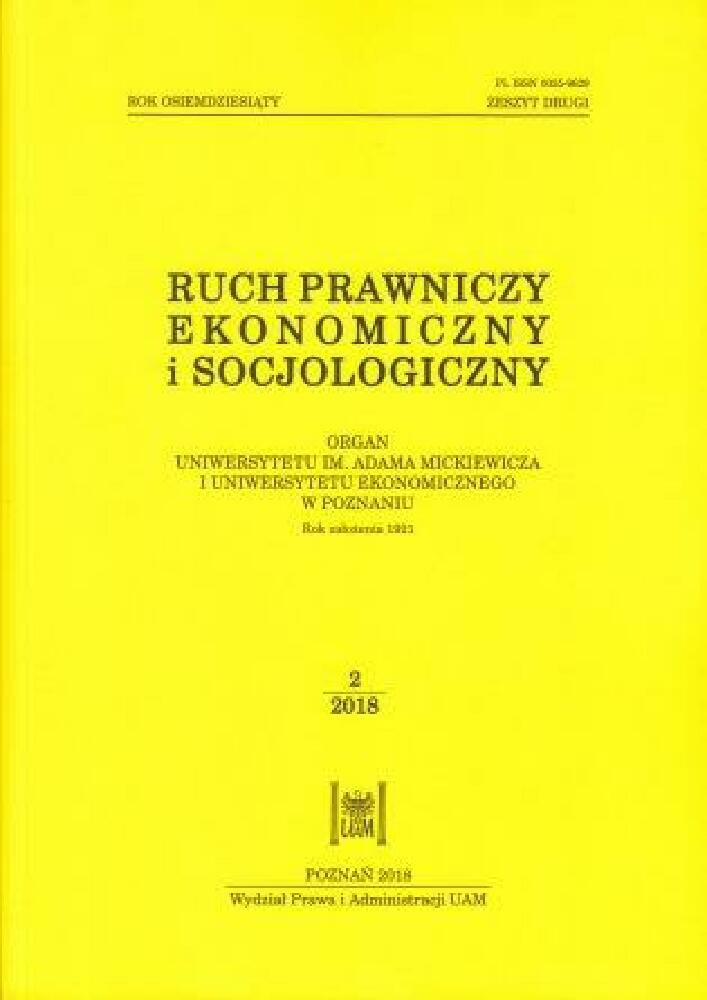Abstract
The discussion presented in this article aims to analyse the impact that the transparency of public finance (i.e. reliable means of providing information) has on the shaping of an active citizenship in society. The analysis was based on the critical question of how the public authority should inform citizens on the processes of collecting and spending public funds. Two aspects have been taken into account: (i) the complicated nature of public finances and (ii) the varying educational backgrounds of recipients of whom society is made of. The authors claim that the principle of transparency of public finance (i.e. informing citizens on public funding) has been inadequately implemented and may not be comprehensible from the point of view of its social addressees. In Poland, the principle of financial transparency is currently primarily focused on a relatively welleducated, well-informed citizen, although its social aspect is not entirely ignored by the doctrine. The authors believe that the manner of reporting on public funds or the State finances should be adjusted to the educational level of the widely understood public who constitute the electorate of the public authority in power. This paper is a part of an extensive research initiated by the authors, which examines the role of moral values in distributing public resources by the authorities. Non-reactive (non-empirical) research methods have been applied with a focus on the literature review, including legislative acts currently in force in Poland.References
Buchanan, J.M., Musgrave, R.A. (2005), Finanse publiczne a wybór publiczny. Dwie odmienne wizje państwa, Warszawa.
Buchanan, J.M., Tollison, R.D. (1972), The Theory of Public Choice: Political Applications of Economics, Ann Arbor: University of Michigan Press.
Cornwell, S., Morgan, D. (2013), Obamacare website gets new tech experts; oversight pressure grows, Reuters, http://www.reuters.com/article/us-usa-healthcare-surge-idUSBRE99U16R20131031 [dostęp: 8.09.2017].
Fukuyama, F. (2005), Budowanie państwa. Władza i ład międzynarodowy w XXI wieku, Poznań.
Gaudemet, P.G., Molinier, J. (2000), Finanse publiczne, Warszawa.
Kaiser Health Tracking Poll, December 2013 (2013), The Henry Keiser Family Foundation, http://kff.org/health-reform/poll-finding/kaiser-health-tracking-poll-december-2013/ [dostęp: 6.09.2017].
Kornberger-Sokołowska, E. (2010), Budżety jednostek samorządu terytorialnego, [w:] Ruśkowski, E. (red.), System prawa finansowego. Prawo finansowe sektora finansów publicznych, t. 2, Warszawa: 231–268.
Ruśkowski, E. (2008), Zasady budżetowe, [w:] Kosikowski, C., Ruśkowski, E. (red.), Finanse publiczne i prawo finansowe, Warszawa.
Malinowska-Misiąg, E., Misiąg, W. (2007), Finanse publiczne w Polsce, Warszawa.
Moe, T. (1984), The New Economics of Organization, American Journal of Political Science 28: 739–777.
Stiglitz, J.E. (2004), Ekonomia sektora publicznego, Warszawa.
Weingast, B.R., Moran, M. (1984), The Congressional-Bureaucratic System: A Principal-Agent Perspective, Public Choice 44: 147–192.
Salachna, J.M., Tyniewicki, M. (2016), Moralność jako element podejmowania decyzji finansowych w sektorze publicznym, Prawo Budżetowe Państwa i Samorządu 3(4): 9–23, http://apcz.pl/czasopisma/index.php/PBPS/article/view/PBPS.2016.012/10388 [dostęp: 8.09.2017].
Strasser, D.(1992), The Finances of Europe, Luxembourg.
Weralski, M. (1984), Finanse publiczne i prawo finansowe, Warszawa.
License
Copyright (c) 2018 WPiA UAM

This work is licensed under a Creative Commons Attribution-NonCommercial-NoDerivatives 4.0 International License.




